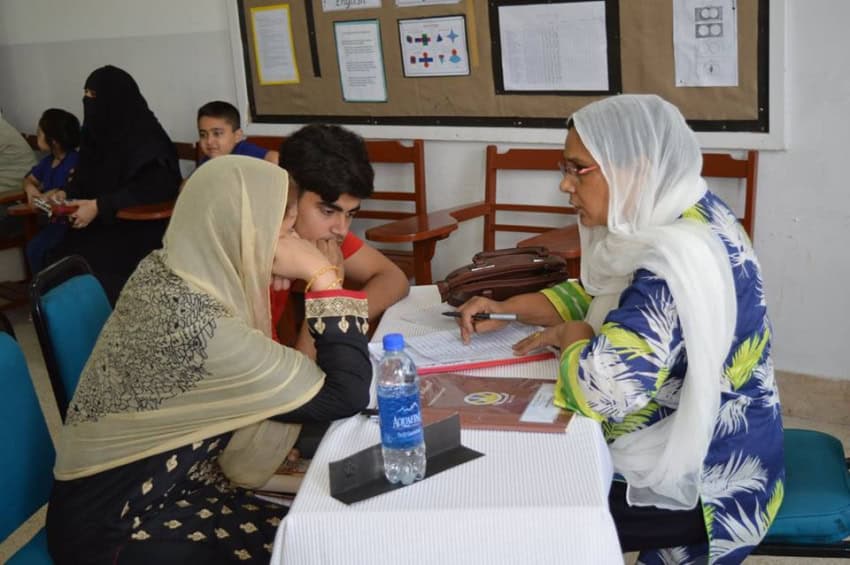In pursuit of a similar objective, teachers and parents’ hand in hand efforts play a pivotal role in defining and accomplishing the goals of a student. A student can only achieve the desired results if parents’ involvement is active, consistent and effective. Oft times, wrongfully, failure in examinations is considered as a failure of the teacher. This approach is common in the land of pure where parents, community and administration all believe that a teacher during a forty minutes’ period must address all the issues of every student attending the class. Candidly, far from practicality, reality and effectiveness, it is to depend on a teacher solely since the parents’ role in learning holds immense significance.
Parent-teacher collaboration is not only important for an effective learning process, but it is also essential for achieving the goals. To optimize learning, monitoring, consultation, sharing of information is inevitable. Provision of meaningful and efficient education is a result of joint efforts undertaken by teachers and parents whereas the institution plays the role of a facilitator, a bridge and a supervisor. It’s time to realize that regular interaction between school and home has a tremendous impact on the positive outcome.
Student’s classroom behaviour is closely related to parents’ involvement. It’s indubitably the most essential determinant in academic progress and character building of a child. Predominantly, the use of force and abusive remarks remains the most practiced method of controlling a class of teenagers in Pakistan. Resultantly, teenagers unaware of the hormonal changes which are rapidly occurring in them are suppressed to the extent that they start finding peace in defiance. This rebellious nature curbs their ability of understanding and positivity having an undesired impact on their behaviour. Ultimately, pupils’ inattentive and opposing behaviour has an immediate impact on the classroom environment. It not only hinders the teaching-learning process but also deprives the good students of utilizing the class time effectively.
Disruptive problems making noise, yelling, hitting the fellow students and disturbing the teachers, all can be resolved if a strong bond between teacher, student and parents prevails at an individual level. Use of force can keep the teenagers silent for forty minutes but can never motivate to understand the concepts. Only parents’ influence coupled with teachers’ guidance can provide an enabling and learning-friendly environment in classroom and school.
Beyond the school activities of teenagers, particularly of children aged 12 to 17 have an everlasting impact on their personality. For instance, a majority of the schools is situated near markets where Snooker clubs, Sheesha centres, and Gaming zones are purposely build to attract the youth. Many students leave their homes early but reach school late almost every day; they waste their precious time and energy in places where they are not allowed to go. Parents, often, due to ignorance, irresponsible behaviour, other priorities fail to supervise their children, consequently, students fall prey to the social evils. These engagements have an irreparable impact on the teenagers learning attitude and social behaviour.
Students’ health, notwithstanding whether physical, psychological or behavioural, holds utmost importance in the learning process. Teachers’ eyes and ears are extraordinarily experienced. They can observe and hear what parents are often unable to do, but all these qualities are of no value if parents have no time to interact or teachers are not willing to keep in touch with parents.
Classroom management is the foundation of building an ideal learning environment, particularly at the matriculation and college level. The biggest challenge Pakistani teachers face is the readiness of the students since managing overcrowded classes without engaging parents becomes impossible. Students are unaware of managing themselves appropriately and come with an experience of obtaining grades by rote learning and attending academies at the end of the session. They only know to listen to the teachers who are emotionless and immensely authoritative for students know that penalty of even a single movement in the classroom will be painful, insulting and shameful.
Mutual understanding and trust between teacher and parent enable a happy learning environment. If we want emotionally balanced and resilient children, parent-teacher interaction is the key to success. Unfathomable progress can be made if students observe a close connection between teachers and parents, for it leaves no vacuum and kids know that there is no communication gap between his teacher and parents.
Parents must spend at least one hour with their kid after school. We must realize that nothing is more valuable, meaningful and effective than being connected. A strong emotional bond can only help kids achieve their goals and become a responsible citizen.
Some tips for parents to get involved:
- Meet teachers at least once a month
- Answer teachers’ calls/messages promptly
- Share prominent changes in the kid with teachers
- Attend school programs/events
- Facilitate child in doing home assignments
- Hold discussions about school with your child every day
- Try to strengthen the bond between teacher and child














